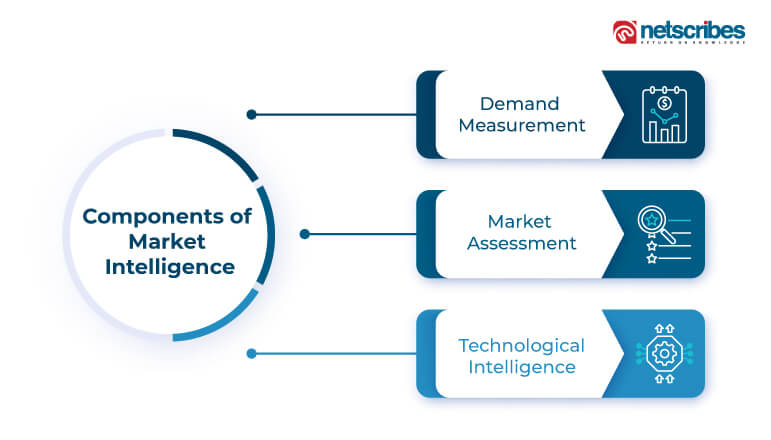HIGHLIGHTS
- Market intelligence is essential for automotive companies to navigate the ever-changing landscape by providing insights into market size, customer preferences, and demand forecasting.
- Understanding the automotive ecosystem, including stakeholders like automakers, suppliers, and regulatory bodies, is vital for long-term success in the industry.
- Keeping abreast of technology trends, such as electric vehicles, autonomous driving, and digital transformations, enables companies to innovate, benchmark, and strategically position themselves.
- Effective utilization of market intelligence empowers automotive companies to make informed decisions, maximize revenue through pricing optimization, and ultimately gain a competitive edge in this rapidly evolving industry.
Market intelligence in automotive market research refers to the systematic collection, analysis, and interpretation of data and information related to the automotive industry. It involves gathering insights on various aspects such as market size, trends, customer preferences, competitive landscape, technological advancements, and regulatory factors. Market intelligence gives automotive companies a deep understanding of the market dynamics, enabling them to make informed decisions, develop effective strategies, and gain a competitive advantage.
The automotive industry is highly dynamic, influenced by changing consumer preferences, technological innovations, government regulations, and global economic conditions. To thrive in this competitive landscape, automotive companies need to stay ahead of market trends, anticipate customer needs, and adapt their strategies accordingly. Hence, market intelligence plays a pivotal role in surviving in the competitive automotive industry.
Market intelligence in the automotive industry
Market intelligence in automotive market research refers to the systematic collection, analysis, and interpretation of data and information related to the automotive industry. It involves gathering insights on various aspects such as market size, trends, customer preferences, competitive landscape, technological advancements, and regulatory factors. Market intelligence gives automotive companies a deep understanding of the market dynamics, enabling them to make informed decisions, develop effective strategies, and gain a competitive advantage.
The automotive industry is highly dynamic, influenced by changing consumer preferences, technological innovations, government regulations, and global economic conditions. To thrive in this competitive landscape, automotive companies need to stay ahead of market trends, anticipate customer needs, and adapt their strategies accordingly. Hence, market intelligence plays a pivotal role in surviving in the competitive automotive industry.

Demand measurement
1. Market sizing
Demand measurement allows automotive companies to estimate the size of the market and segment it based on various factors such as demographics, geographic locations, and customer profiles. By accurately assessing the market size, companies can determine the potential demand for their products, identify attractive market segments, and allocate resources effectively.
2. Understanding customer needs
Demand measurement helps automotive companies understand the specific needs and preferences of their target customers. It involves collecting and analyzing data on customer behavior, such as purchasing decisions, brand loyalty, product features, and price sensitivity.
3. Demand forecasting
Demand forecasting in the automotive sector as a part of market intelligence involves predicting the future demand for vehicles, parts, or specific automotive features and services. Several forecasting techniques which are commonly used in the automotive industry to estimate future demand are:
- Time series analysis
- Regression analysis
- Delphi method
- Machine Learning and Artificial Intelligence (AI): Machine learning and AI techniques can analyze large volumes of data, including historical sales data, customer data, and external factors, to identify patterns and generate accurate demand forecasts.
4. Pricing and revenue optimization
Demand measurement plays a vital role in determining optimal pricing strategies and maximizing revenue in the automotive industry. Companies can set prices that balance profitability with customer affordability by understanding customer demand and price elasticity. Demand measurement helps identify price thresholds, evaluate the impact of price changes on demand, and optimize pricing strategies to maximize sales and revenue.
Market assessment
Automotive market research focuses on determining the various stakeholders involved in the market. It helps in chalking out the entire ecosystem. Various stakeholders in the ecosystem are as follows:
- Automakers
- Suppliers
- Dealer and dealership network providers
- Competitors
- Consumers
- Aftermarket segment
- Financial Institutions
- Government and Regulatory Bodies
These components collectively shape the automotive market structure. Understanding the interplay between these components is crucial for the performance of the company in the long term.
Related reading: Market landscape analysis for Glass Fiber-SMC in the automotive sector
Technological intelligence
In automotive market research it refers to the process of gathering and analyzing information about technological advancements, innovations, and trends within the automotive industry. It involves monitoring and assessing the development and adoption of technologies that impact the automotive sector, such as –
- Development of electric vehicles
- Autonomous driving
- Connected cars
- Advanced driver-assistance systems (ADAS)
- Alternative fuel sources like hydrogen fuel cell vehicles, etc
- Digital transformations
- Advanced manufacturing processes
By tracking the technologies adopted by competitors, companies can benchmark their own technological capabilities, identify areas of strength or weakness, and develop strategies and new products to differentiate themselves in the market. Technology intelligence helps identify technical gaps in the market and guides companies in acquiring or developing the necessary technologies.
In conclusion, market intelligence plays a vital role in automotive market research due to its significance in understanding the industry landscape and making informed decisions. it empowers companies with the knowledge needed to understand customers, identify opportunities, assess competition, mitigate risks, know the various technological advances, and make strategic decisions. By utilizing market intelligence effectively, automotive companies can gain a competitive advantage, enhance customer satisfaction, and drive business growth in a rapidly evolving industry.
For over two decades now, Netscribes’ automotive and mobility solutions have assisted top automakers, OEMs, and industry leaders in comprehending the influence of emerging technologies and uncovering fresh avenues for growth. Reach out to us today to explore how we can support your journey toward innovation and adeptly steer through the ever-changing automotive terrain.
Based on insights by Kanika Shukla, Senior Analyst, Netscribes






